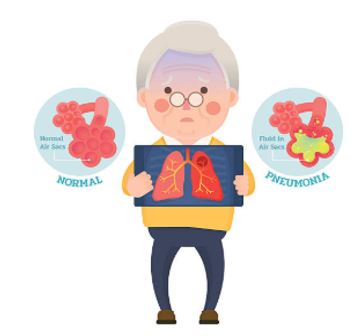 There are many pathogens (microorganisms that cause disease) that can cause pneumonia, found in air that we breathe. Usually, the body can prevent these pathogens from getting into the lungs but sometimes they can over-power the immune system even if your general health is good.
There are many pathogens (microorganisms that cause disease) that can cause pneumonia, found in air that we breathe. Usually, the body can prevent these pathogens from getting into the lungs but sometimes they can over-power the immune system even if your general health is good.
The most common cause of pneumonia is a bacterium called Streptococcus pneumoniae.
As well bacterial pneumonia, there are other types outlined below:
- Hospital acquired pneumonia - some people may go on to develop pneumonia during their stay at hospital. This can be serious because the people that get it are already ill and the bacteria causing it may be more resistant to antibiotics. The intensive care units often use ventilators (breathing machines) which means people are a higher risk of this type of pneumonia.
- Aspiration pneumonia – occurs when a person inhales their food, drink, vomit or saliva into their lungs, so aspiration pneumonia may occur if something disturbs their gag reflex such as brain injury or swallowing difficulties.
- Viral pneumonia - some of the viruses that cause colds and flu can also cause pneumonia and is the common cause of pneumonia in young children.
- Fungal pneumonia – associated with people that have chronic health problems or a weakened immune system.
